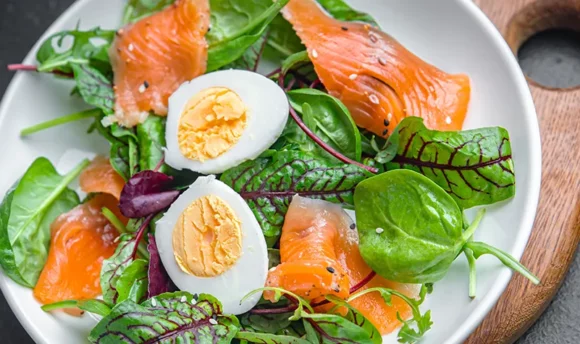Keto Fruit List: The Only Guide You’ll Need
Most people assume that fruits are off-limits on the ketogenic diet, but there are some low-carb fruits you can consume, provided you eat them in moderate quantities. We’ve summarized the best low-carb fruits for the keto diet in this article.
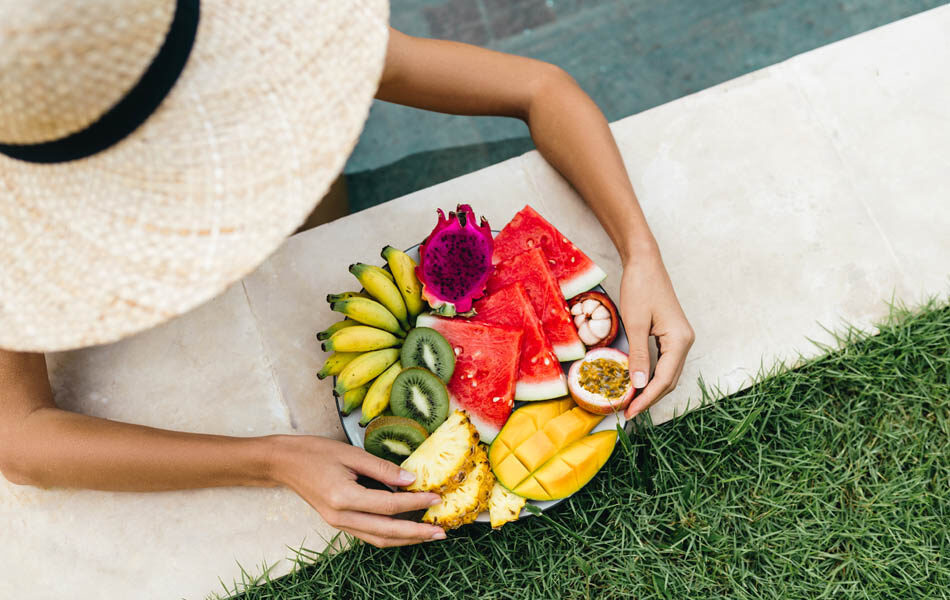
The keto diet has strict rules for what you can and can’t eat. Keto dieters need to eat a low-carb diet and increase their fat intake to maintain the metabolic state of ketosis. These guidelines can make the keto diet seem incredibly restrictive, but there are tons of foods you can still eat.
Many people believe that you cannot eat fruit on the keto diet, but that is untrue. Instead, you must find low-carb fruits to eat to maintain ketosis. The best news is that there are lots of them!
To help you get to know which low-carb fruits you can eat on the ketogenic diet, we’ve pulled together the ultimate keto fruit list. Each fruit has a low enough net carbs value to be suitable on the ketogenic diet and is an excellent addition to your eating pattern. Take a look now to learn more about low-carb fruits.
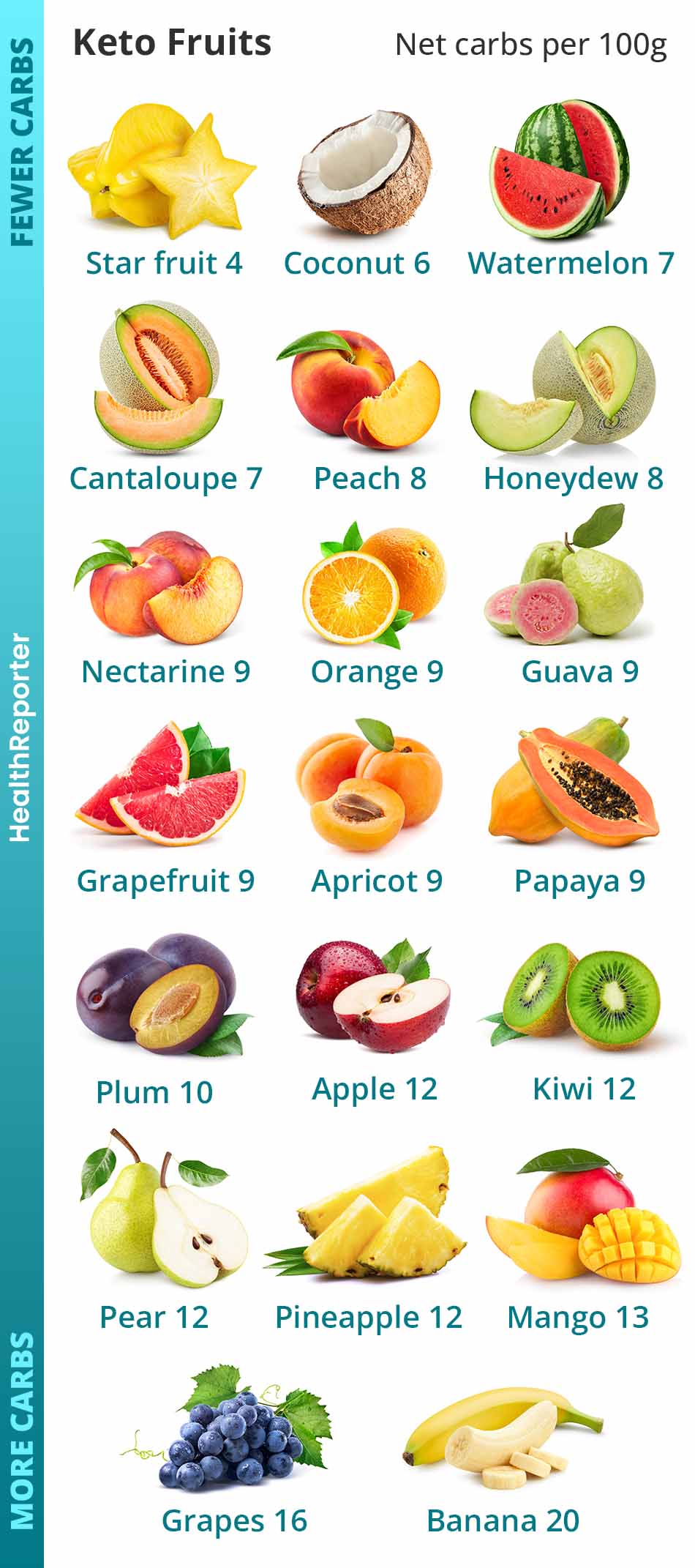
The Ultimate Keto Fruit List: Top 20 Low-Carb Options
Below, we’ve gathered the best keto-friendly fruits to add to your diet. We’ve listed their nutritional values so that you can add the net carbs to your daily intake and ensure you maintain ketosis. Take a look now to learn more.
#1 Star fruit
Star fruit, or carambola, is a low-carb fruit with a sweet and sour flavor. It comes in the shape of a five-point star. The nutritional value for star fruit per 100g is as follows:
- Calories: 31kcal
- Protein: 1.04g
- Fats: 0.33g
- Total carbs: 6.73g
- Net carbs: 3.93g
- Fiber: 2.8g
With only 3.93 grams of net carbs, star fruit is a great low-carb fruit to consume on the keto diet. Star fruit is also high in fiber and plant compounds, including antioxidants and anti-inflammatory compounds.
#2 Coconut
It’s probably no surprise that coconut is one of the best keto fruits you can choose since coconut oil and MCT oil are both keto-friendly, too. Coconut is a fatty and low-carb choice when it comes to keto fruit options. The nutritional value of coconut per 100g is below.
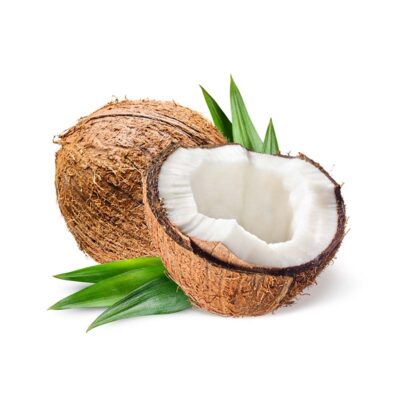
With 6.2 grams of net carbs but a massive 33.5g of fat, coconut is an excellent choice when it comes to keto fruits. It’s low-carb, high-fat, and it’s whole and healthy. Coconut is also incredibly high in the mineral manganese, which is important in the metabolism of carbohydrates.
Coconut is also an excellent source of medium-chain triglycerides, which are great for heart health and enhancing weight loss.
#3 Watermelon
Watermelon is a delicious addition to your keto diet, and you can get it in fruit juices as a refreshing beverage. The nutritional value of watermelon per 100g is as follows:
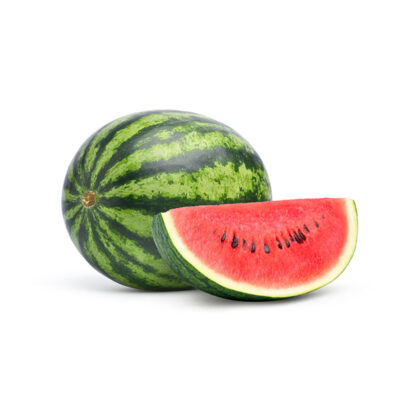
Watermelon does have a low-fat value, and while it is a relatively low-carb option, we still recommend eating it in moderation on the ketogenic diet. As it has low fiber content, most of the carbs in watermelon will be absorbed by the body, resulting in a rise in blood glucose.
The net carb count of watermelon refers to the carbs that are made up of sugar and will be absorbed by the body. Net carbs in whole foods equal the total carb content minus the fiber content, as fiber will not be absorbed by the body.
#4 Cantaloupe
Cantaloupe is a type of melon and offers a refreshing snack for ketogenic dieters. Though it is relatively low in net carbs, we advise moderation when it comes to cantaloupe to ensure you stick to a low-carb keto diet. The nutritional value of cantaloupe per 100g is below.
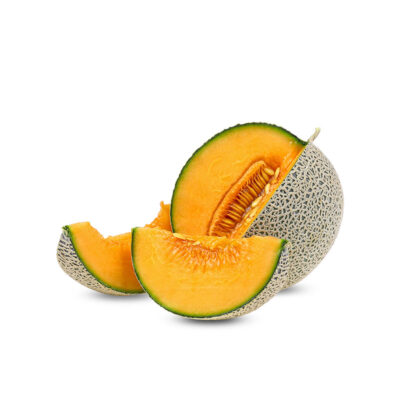
Cantaloupe is high in beta-carotene, which is converted to vitamin A in the body and protects eye health and the immune system. It’s also high in vitamin C and contains lots of water to help keep you properly hydrated.
#5 Peach
Like many stone fruits, peaches have a high level of antioxidants which are great for protecting the body against free radical damage. You can also find canned peaches for convenience. As with many keto-friendly fruits on this list, we recommend eating peaches in moderation to stick within your daily carb allowance.
The nutritional value of peaches per 100g is as follows:
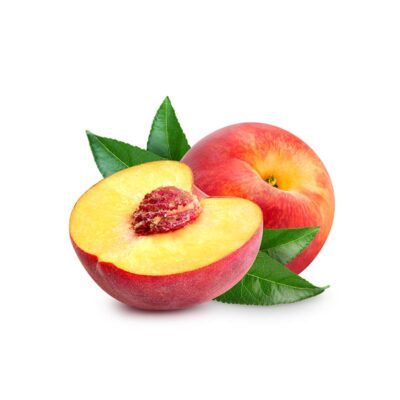
Peaches can be eaten as a snack or added to salads for a sweet hit in your lunchtime meal.
#6 Honeydew
Another melon option, honeydew is the perfect snack for a sunny summer’s day. The nutritional value of honeydew per 100g is as follows:
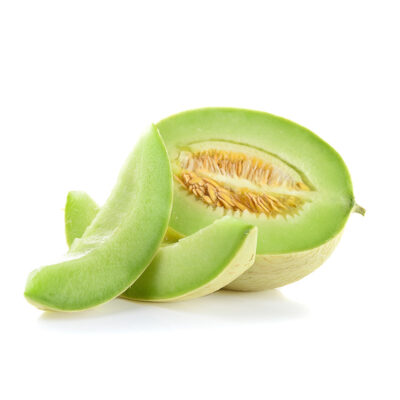
As a fruit with relatively low fiber content, we recommend eating honeydew in moderation on the keto diet, as most of the net carb count of this melon will be absorbed into the bloodstream.
#7 Nectarine
The smooth-skinned sibling to peaches, nectarines are packed full of nutrients and antioxidants that keep you in good health. The nutritional value of nectarines per 100g is as follows:
- Calories: 43kcal
- Protein: 1.06g
- Fats: 0.28g
- Total carbs: 9.42g
- Net carbs: 7.92g
- Fiber: 1.5g
Nectarines are iron-rich and anti-inflammatory and come with many other health benefits. The net carb count of nectarines is relatively high, meaning you should eat nectarines in moderation on keto.
#8 Oranges
Citrus fruits are known for their rich nutrient content, and most fruits in the citrus family are relatively low in carbs. The nutritional value of oranges per 100g is as follows:
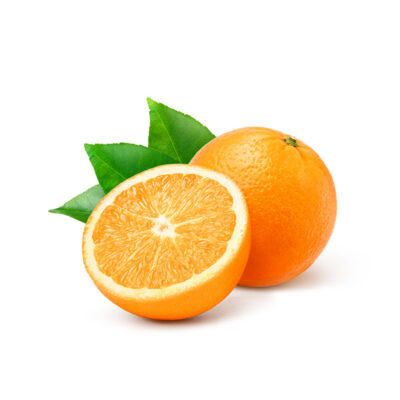
With 9.8 grams of net carbs, oranges are a good keto fruit to eat for a nutritious, whole, and healthy snack. It is important to note that fruit juices, like orange juice, are not good for the ketogenic diet, and it is best to eat whole fruit to get all the nourishing fiber content.
#9 Guava
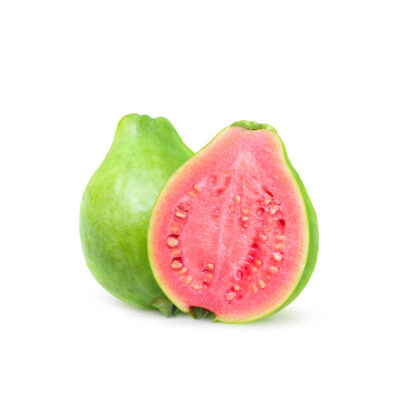
Guava is a wonderfully healthy fruit with many benefits that most people do not know about. Indeed, it is thought to be a good fruit for diabetes patients as it helps to lower blood sugar.
As a keto fruit, guava has a moderately low net carb value, making it a good option for people on keto.
Guava has a higher fiber content than other fruits on this list, with 5.4 grams of fiber per 100g, which makes it a good choice for keto dieters. It’s also very high in vitamin C, which is good for the immune system.
#10 Grapefruit
Grapefruit is a rich source of vitamin C and is a keto-friendly fruit for you to add to your diet. It is often found in weight loss programs because of its low-carb value. It is important to note that grapefruit contains 0.1 grams of fiber, meaning most carbs will be absorbed easily into the bloodstream.
The nutritional value of grapefruit per 100g is as follows:
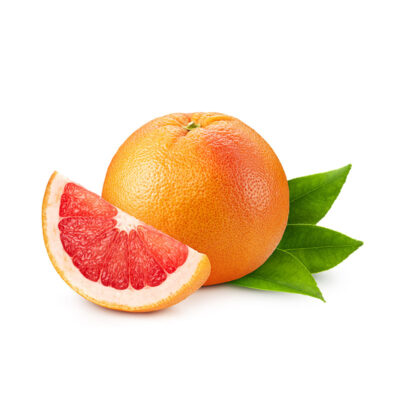
While it is improbable that you will eat more than 100g of grapefruit in a day, remember to record your daily carb allotment so that you don’t exceed the 20–30g limit.
#11 Apricot
Another stone fruit with lots of antioxidants and fiber-filled skin, apricots are tiny powerhouses of nutrition. They also contain a decent amount of vitamin C and are good for gut health because of their high fiber content.
The nutritional value of apricots per 100g is as follows:
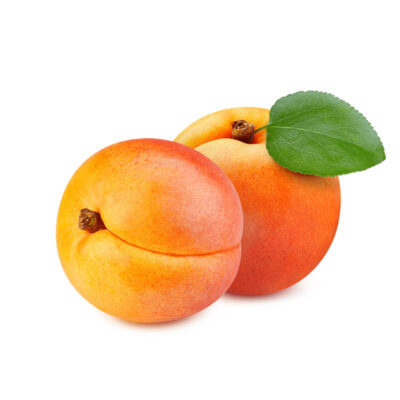
Like many keto fruit options, apricots have a relatively low net carb content and are a whole and healthy food to add to your diet. It is important to note that dried fruits, like dried apricots, are unsuitable for keto. It is best to stick with fresh apricots.
#12 Papaya
Papaya is an anti-inflammatory tropical fruit packed full of antioxidants. It is thought to improve digestion and is a keto-friendly fruit to add to your diet. The nutritional value of papaya per 100g is below.
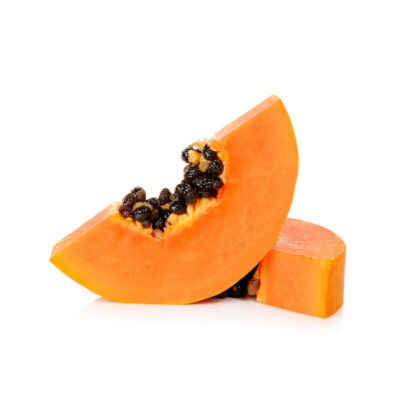
Papaya has 1.7g of dietary fiber per 100g, which helps lower the overall net carb content of this fruit. However, eat in moderation to stay in ketosis.
#13 Plums
Plums are a great fruit for your autumn and winter keto recipes. The nutritional value of plums per 100g is as follows.
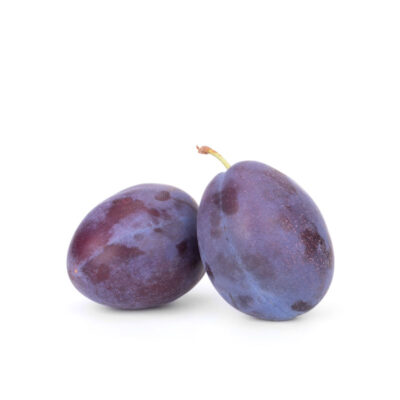
Plums have slightly more carbs than other fruits in this keto fruit list, and it is best to eat them in moderation. Plums are known for their sweet taste and high antioxidant level. Plums also have high potassium and vitamin C levels – both of which promote heart health.
#14 Apples
Apples are a fiber-rich fruit to add to your keto meal plan. They’re thought to be good food for diabetes and may have benefits for heart health too. However, you should eat a maximum of one apple a day to stay within your daily carb limit.
The nutritional value of apples per 100g is as follows.
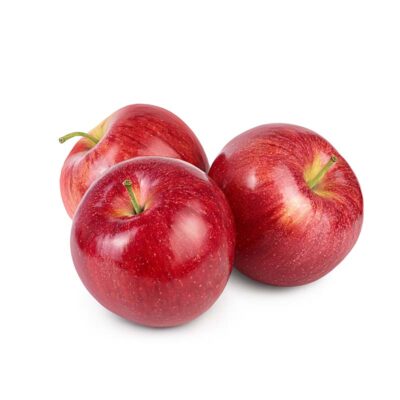
Per normal serving size, apples have a pretty low carb content and are whole foods, making them good on keto. It is important to note that even though apples are a good keto fruit, apple juice is off-limits. The sugar content, without the added fiber, in apple juice is too high for the ketogenic diet, and even one cup could knock you out of ketosis.
#15 Kiwi
Kiwi fruit is a good fruit on keto. It contains lots of vitamins and minerals. Research suggests that consuming kiwis can raise your HDL cholesterol levels. This good cholesterol can promote heart health. However, this fruit is relatively high in net carbs, so you should take a look at your portion size.
The nutritional value of kiwis per 100g is below.
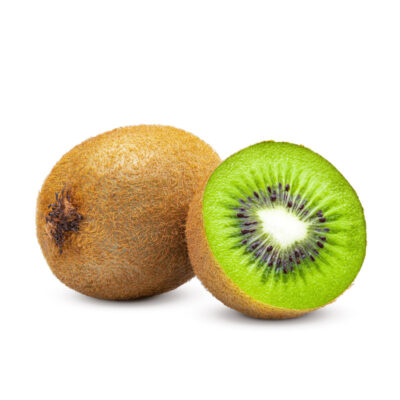
Kiwi has a high net carb value, but a normal serving size of kiwi shouldn’t knock you out of ketosis. It is important to eat kiwi in moderation on keto to stick to your daily carb limit.
#16 Pear
Pears are nutritious and contain essential nutrients like potassium and copper. They’ve got a high fiber content and can be used in both baking and cooking. The nutritional value of pear per 100g is as follows.
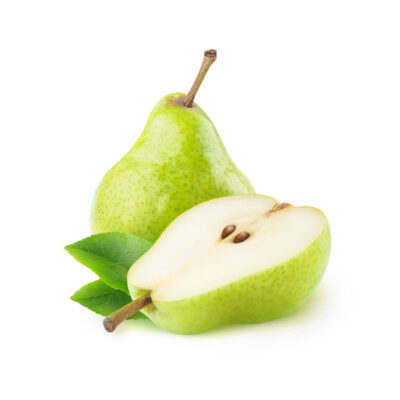
#17 Pineapple
Pineapple is known for its tangy and sour flavor. It can be used in baking and makes for a controversial pizza topping. It’s got tons of antioxidants that could reduce some illnesses, and it has anti-inflammatory properties.
The nutritional value of pineapple per 100g is below.
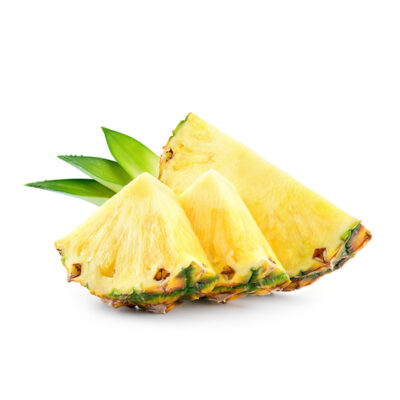
#18 Mango
Mango is a tropical fruit that may have some weight loss benefits and is packed full of nutrients, including copper, folate, and plant compounds like catechins. The nutritional value of mango per 100g is as follows.
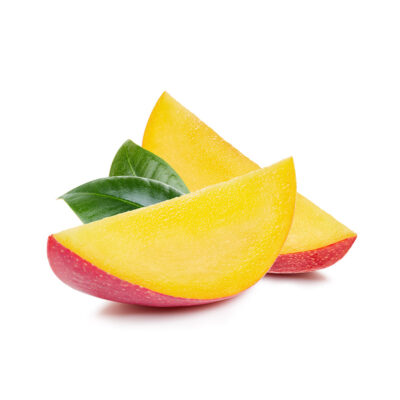
For the ketogenic diet, we recommend eating mango in limited quantities due to its moderate net carb value.
#19 Grapes
Grapes are sweet and perfect for snacking on. There is research to suggest that grapes can inhibit the absorption of cholesterol, reducing overall levels and promoting heart health. They’re also a great source of antioxidants. The nutritional value of grapes per 100g is below.
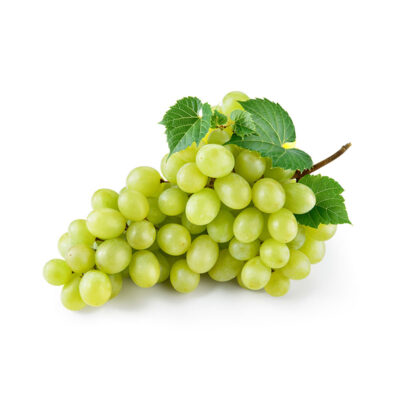
Grapes have a high net carb count per 100g and so should only be consumed in limited quantities on the keto diet.
#20 Banana
Bananas are a great snack if you’re looking to refuel. They do have quite a high carb count per 100g, but if eaten in limited quantities, you can still eat them on keto. The nutritional value of bananas per 100g is below.
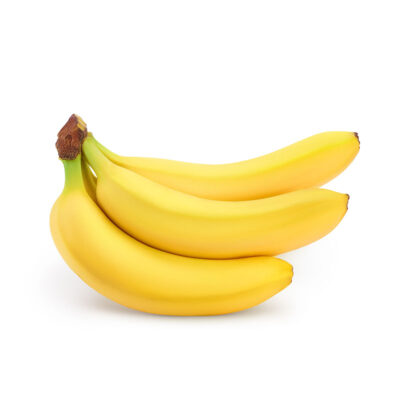
FAQs
Yes, you can eat many low-carb fruits on the keto diet. The best options are usually berries, which are low-carb but packed full of vitamins and minerals.
The lowest-carb fruit is star fruit. Star fruit contains only 3.93g of net carbs, making it the best low-carb fruit you can consume. Avocado may also be classed as fruit and has only 2g of carbs, making it lower in carbs than star fruit.
Fruits are generally high in natural sugars, like fructose, so no fruit is truly sugar-free. Low-sugar fruits include lemons and limes, avocados, olives, and star fruit.
A Word From a Nutritionist
Fruit is an excellent way to get all the vitamins, minerals, and plant compounds that keep your body in good health. Packed with antioxidants and other compounds with many health benefits, it is better to reach for fruit as a snack than processed foods.
However, fruit is high in sugar. When it comes to the keto diet, you need to eat a low-carb diet, which means eating fruit with low-carb and low-sugar contents. The best fruit for the keto diet is low in carbs and high in fiber. The more fiber you eat, the less likely your blood sugar is to spike and the less likely you are to be knocked out of ketosis.
If you choose to eat fruit on the keto diet, remember to choose low-sugar, low-carb fruits with lots of fiber and eat them in moderation. Count your carb intake daily and ensure you’re eating a well-rounded ketogenic diet by eating healthy fats and low-carb vegetables, too.
Conclusion
There are many keto-friendly fruits to reach for on the keto diet. The best low-carb fruits to choose from are also low in sugar and high in fiber. If you prefer to eat fruit on the keto diet, pick low-sugar, low-carb fruits with plenty of fiber and consume them in moderation.

















































 Select your language:
Select your language: 








